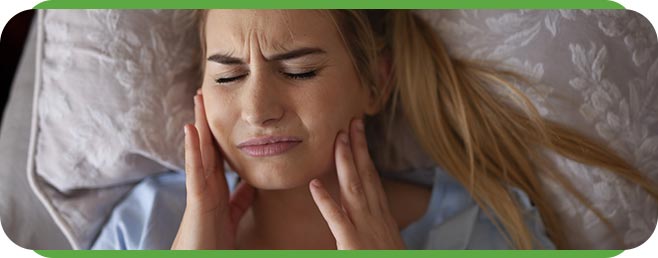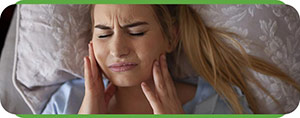What Does a Bruxism Headache Feel Like?
If you have headaches with a habit of grinding your teeth and clenching your jaw, there might be a possibility that the constant headaches you experience are due to bruxism. Most of the time people ignore these symptoms but pressure sensitivity indicates that your headache is caused by it. Our team of professionals at Koala® Center For Sleep & TMJ Disorder for more information contact or visit us online to book an appointment. We have convenient locations across the U.S. in Bloomington IL, Peoria/Dunlap IL, El Paso TX, and Wausau WI.


Table of Contents:
Where are bruxism headaches located?
What kind of headache does bruxism cause?
How do you know if your headache is from your teeth?
What helps a headache from jaw clenching?
The temples, forehead, or area behind the eyes are the typical locations for bruxism headaches. This is because bruxism, or teeth grinding and clenching, often leads to tension in the jaw, neck, and head muscles. This tension commonly causes headaches.
Bruxism can also result in other symptoms like jaw discomfort, earaches, and dental sensitivity in addition to headaches. It’s crucial to speak with a sleep specialist if you think you could be clenching or grinding your teeth when you sleep. The sleep specialist will work with your dentist to make treatment recommendations, help you feel better and avoid additional harm.
Tension headaches often result from bruxism and can continue for hours or even days. Tension headaches feel like a steady, dull aching or pressure on both sides of the head. The discomfort is typically mild to moderate in severity and is frequently accompanied with soreness in the muscles of the shoulder, neck, and scalp.
Bruxism-related muscle tension can also lead to other types of headaches, such as migraines or cervicogenic headaches. Throbbing pain, sensitivity to light and sound, and nausea or vomiting are the common symptoms of migraines. Cervicogenic headaches affect one side of the head and are often a sign of an underlying condition, such as bruxism.
Headaches caused by bruxism are often very frustrating and uncomfortable, so it is highly urged to receive treatment to alleviate your symptoms and improve your quality of life. If you experience headaches due to bruxism, book an appointment at Koala® Center For Sleep & TMJ Disorders to receive comprehensive and top-quality care.
There are several symptoms and signs that could point to a tooth-related cause for headaches, such as:
• Dental issues -Your headache may be tooth-related if you have a history of dental issues such as cavities, gum disease, or tooth abscesses.
• Grinding or clenching – If you clench or grind your teeth, this may tighten the muscles in your neck and head and result in headaches.
• Pressure sensitivity – If your teeth feel sensitive to pressure or if you have discomfort when biting down or chewing, this may indicate that your headache is caused by your teeth.
• Location of pain – Rather than in the back of the head or neck, tooth-related headaches frequently induce pain in the temples, forehead, jaw or behind the eyes.
Jaw clenching and teeth grinding can lead to chronic, frustrating headaches. Fortunately, there are a variety of treatments that can help reduce the discomfort and stop additional harm to your teeth, jaw and health. A custom-made mouthguard is one of the best remedies for bruxism headaches. This appliance is made to go over your teeth and stop them from clenching or grinding while you sleep. A mouthguard relieves headache discomfort and tooth damage by lowering the pressure on your teeth and jaw muscles.
You can try several other remedies in addition to using a mouthguard to manage bruxism headaches, such as:
• Stress-reduction strategies like deep breathing and meditation.
• Applying a warm compress to areas of discomfort.
• Over-the-counter medications such acetaminophen or ibuprofen.
• Avoiding alcohol and coffee as they might make symptoms worse.
• Practice good oral hygiene to prevent cavities and gum disease, which lead to bruxism.
At Koala® Center For Sleep & TMJ Disorders, we offer comprehensive care to alleviate your discomfort and prevent further damage to your teeth and jaw. We will provide you with a personalized treatment plan to address underlying health issues that may be contributing to your symptoms. Our goal is to help you get a good night’s sleep and wake up feeling refreshed and pain-free. Our experienced team of sleep professionals and physicians can accurately diagnose and treat bruxism, which is often the underlying cause for persistent tension headaches. For more information, please contact us today or request an appointment online. We have convenient locations in Bloomington IL, Peoria/Dunlap IL, El Paso TX, and Wausau WI.

Additional Services You May Need
▸ KoalaKIDZzz®
▸ Sleep Apnea
▸ Snoring
▸ TMJ Disorder
▸ Fatigue
▸ Sleep Disorders
▸ Weight Loss
▸ CPAP Alternative
▸ Oral Appliances




